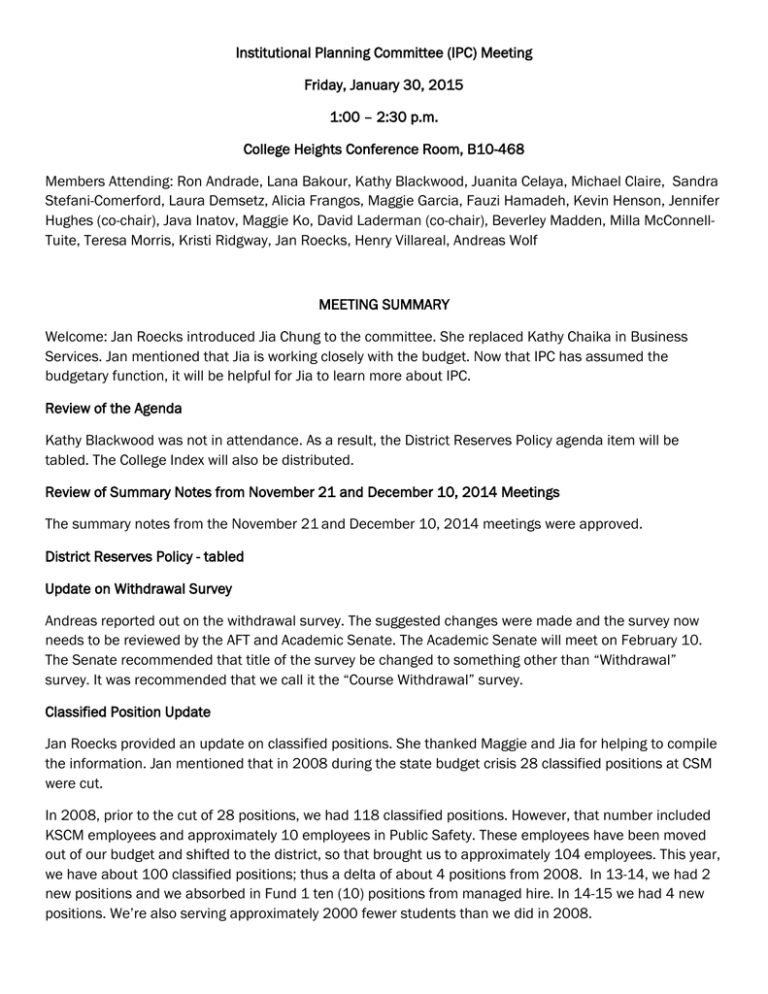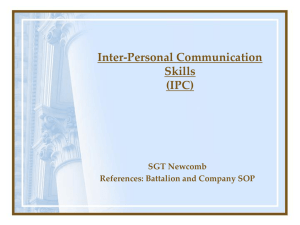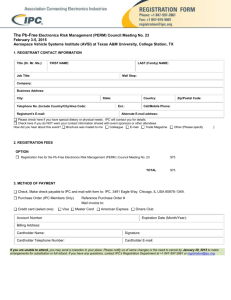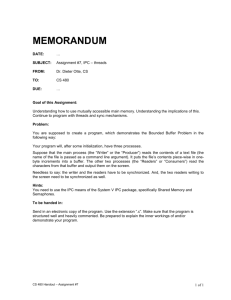Institutional Planning Committee (IPC) Meeting Friday, January 30, 2015
advertisement

Institutional Planning Committee (IPC) Meeting Friday, January 30, 2015 1:00 – 2:30 p.m. College Heights Conference Room, B10-468 Members Attending: Ron Andrade, Lana Bakour, Kathy Blackwood, Juanita Celaya, Michael Claire, Sandra Stefani-Comerford, Laura Demsetz, Alicia Frangos, Maggie Garcia, Fauzi Hamadeh, Kevin Henson, Jennifer Hughes (co-chair), Java Inatov, Maggie Ko, David Laderman (co-chair), Beverley Madden, Milla McConnellTuite, Teresa Morris, Kristi Ridgway, Jan Roecks, Henry Villareal, Andreas Wolf MEETING SUMMARY Welcome: Jan Roecks introduced Jia Chung to the committee. She replaced Kathy Chaika in Business Services. Jan mentioned that Jia is working closely with the budget. Now that IPC has assumed the budgetary function, it will be helpful for Jia to learn more about IPC. Review of the Agenda Kathy Blackwood was not in attendance. As a result, the District Reserves Policy agenda item will be tabled. The College Index will also be distributed. Review of Summary Notes from November 21 and December 10, 2014 Meetings The summary notes from the November 21 and December 10, 2014 meetings were approved. District Reserves Policy - tabled Update on Withdrawal Survey Andreas reported out on the withdrawal survey. The suggested changes were made and the survey now needs to be reviewed by the AFT and Academic Senate. The Academic Senate will meet on February 10. The Senate recommended that title of the survey be changed to something other than “Withdrawal” survey. It was recommended that we call it the “Course Withdrawal” survey. Classified Position Update Jan Roecks provided an update on classified positions. She thanked Maggie and Jia for helping to compile the information. Jan mentioned that in 2008 during the state budget crisis 28 classified positions at CSM were cut. In 2008, prior to the cut of 28 positions, we had 118 classified positions. However, that number included KSCM employees and approximately 10 employees in Public Safety. These employees have been moved out of our budget and shifted to the district, so that brought us to approximately 104 employees. This year, we have about 100 classified positions; thus a delta of about 4 positions from 2008. In 13-14, we had 2 new positions and we absorbed in Fund 1 ten (10) positions from managed hire. In 14-15 we had 4 new positions. We’re also serving approximately 2000 fewer students than we did in 2008. Jan noted that we our annual operating budget has increased by about 2 million since 2008. However, these additional funds have been spent to cover increased compensation for all employee groups, step and column increases, and other increased operating expenses. And, while we are now a community supported district, which provides us more funding than we would receive through state apportionment, as well as more stability in the budget, the majority of that funding has been earmarked for compensation for all employee groups. In addition, the required district contribution to the retirement systems (PERS/STRS) for all employees has increased impacts the general budget. Finally, even though the district was successful in passing a new bond, these funds are restricted to capital improvements and cannot be used to hire employees or meet operating costs. It was suggested that IPC be provided with the positions that were approved based on the new classified hiring process that was established. It is important that we close the loop and report back to IPC about any new positions that are approved for hiring via our process. This will help ensure transparency of the process. Review Procedure/Structure for Budget Process Jan Roecks mentioned that the small group (Henry Villareal, Laura Demsetz, Mike Claire, Jan Roecks) had not yet met, but Jan had given some thought as to how budgetary information might be shared with IPC. The general approach is to provide IPC with an overview of where the college’s funding comes from and from what sources (e.g. general funds, categoricals, etc.). We will also be provided information regarding how the money has been spent, including our fixed costs. This will allow IPC to have a better understanding of what is left in the budget (or percentage of the budget) available to fund various initiatives and meet other institutional costs. If the committee wishes to have more detailed information or information about the budget development process, the small group can provide this. It was also suggested that the work group develop a glossary of common budgetary terms for committee members. Committee members thought this overall approach to be satisfactory. It can be revisited later if the committee wishes. Printing Class Schedule Jennifer Hughes provided information regarding the history of the printing of the class schedule. Many years ago, as a result of the budget cuts, the college moved from a glossy print schedule to a newsprint schedule and reduced some of the course information (i.e. course description, prerequisite information). At the same time, the class schedule also evolved into a greater marketing piece to “tell the CSM story” to the community, in addition to providing class information. The college recently completed a Business Process Analysis (BPA) with the Office of Instructional staff, division deans, and others. The purpose was to review the entire class scheduling process. This is a very time-consuming project that takes significant staff time three times a year in a variety of offices and divisions. In addition, there are always changes to the schedule after it has been printed. Deans and other staff frequently hear from students who are upset because of a change that has occurred in the schedule (e.g. change in instructor). Finally, the WebSchedule has become a more robust tool and provides students with the most up-to-date schedule information. Thus, it was suggested that we explore not printing the class schedule in its current format. Many colleges have stopped printing class schedules. The plan would be to produce a document that would include the feature articles about CSM’s program, faculty, and students. We would then produce some type of in-house document to be available to students and staff with the list of classes that could be distributed throughout the campus and in key locations in the community (e.g. high schools, adult schools). It might also be a document that could be a PDF available on the website that anyone could print it from any location. Some preliminary discussion has taken place with the Instructional Office regarding what type of Banner reports might be possible to print that would provide the class information. It was also suggested that we consider printing an “open class” list, similar to what is currently available on WebSchedule. Finally, we also need to have the ability to archive the class schedule for auditing purposes, the 320 reports, etc. Bev will do some research regarding how other colleges are handling the archiving of class schedules and catalogs. It was suggested that we conduct some student focus groups and work with Community Relations and Marketing to help message the pending change in this class schedule. Committee members were requested to give this more thought and talk with their constituencies. Further discussion will take place at the February 27 meeting. Calendaring Agenda Items Jennifer Hughes and David Laderman presented a document that outlined the agenda items for the spring semester. We need to make sure we have ample time for key activities that take place in the spring; reviewing all the program reviews and the EMP. The group discussed extending a couple of Friday meeting dates so as to avoid meeting on Saturdays. We also need to make time for the coordinators of Puente, Umoja, and Honors to report on their progress to IPC. The committee also talked about the program review date. Currently, the date falls in the middle of spring break. David has received inquiries from faculty whether the date will change. After much discussion, it was agreed that we would move the due date to March 30. IPC will then conduct its review of the program reviews on April 17. This will provide time for PRIE to extract the equipment and personnel requests. This will also allow time for the administrators to prioritize classified requests for presentation to Cabinet and for the instructional equipment requests to go through the prioritization process with the instructional administrators. Next Meeting: Friday, February 27, 1:00 – 3:00 p.m. College Heights Conference Room, Bldg. 10-468.





